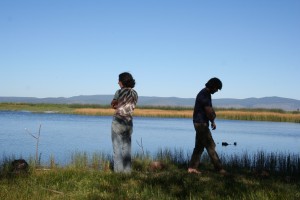
If you picture going to a therapy session, you might see yourself in a chair, in an office decorated with tacky floral paintings, with a therapist (in her chair) taking notes under the fluorescent light. If you’re lucky, the window looks out toward a few trees, and not just a parking lot.
If this image doesn’t seem inspiring, take heart— a new movement in therapy and counseling is moving the sessions outside for a breath of fresh air.
Ecopsychology—the study of the human relationship to the natural world—is giving us a better understanding of how mental well-being is linked to our natural environment.
“Much of the work in psychology has been done in human-centered urban settings,” said Thomas Doherty, an ecopsychologist at Lewis and Clark University in Oregon. But humans are a part of nature and cannot be considered only in the contexts they’ve constructed for themselves. “So we’re expanding the territory,” Doherty said. “We’re leaving the building.”
According to a 2009 report by the U.S. Environmental Protection Agency, Americans spend, on average, more than 90 percent of their time indoors, so it’s no wonder that our relationship with the natural world doesn’t go very deep. The idea that reversing this disconnect can have serious benefits for our emotional and mental health is gaining ground in the psychology community.
For example, a 2005 study by researchers at the University of Essex showed that weekly therapeutic countryside walks helped significantly improve self-esteem and mood levels for participants experiencing mental health problems. The treatment’s effectiveness rivaled that of antidepressants.
Ginny Anderson, a Menlo Park psychotherapist who got her Ph.D at Stanford, leads hikes and therapy circles in wild places throughout the Bay Area. She notes the stress many feel when regularly confronted with bad environmental news, without having a clear way to respond and make a real difference. Anderson starts by helping her clients get in touch with the environment they are concerned about.
She recently took a group of clients to San Bruno Mountain, where they sat on a hillside of wildflowers and watched butterflies in their mating season. Her clients, some of whom are engaged in fights over air quality measures in the Peninsula, left feeling much less despair and hopelessness, she said. “Who would want to spend their time working for something they don’t even have a connection to?”
But Anderson’s goal is not just to help environmentalists be more effective; it’s also to help her clients slow down, unplug from frenetic Silicon Valley life and begin to get in touch with themselves and their emotions by connecting with the life around them.
Ecotherapy exercises may include outdoor therapy sessions, farming and gardening, working with dogs, horses or other animals, or doing meditation and awareness-based exercises in nature. Therapists might take clients on extended hiking trips, combining outdoor group therapy with adventure activities that help build trust and confidence. Some also integrate spiritual practices that help clients connect with the natural world, such as the vision quest, a several-day period of guided isolation in the wilderness, which clients say helps them grapple with fears, explore new states of consciousness, and emerge feeling like they understand themselves better.
The underlying assumption of ecotherapy, according to Santa Barbara psychotherapist Linda Buzzell, is that humans are relational creatures, embedded in the rest of nature in the same way that we are embedded in a family or in a community. Ecotherapy, she said, seeks to re-establish and heal our relationship with nature, just as family therapy focuses on frayed relationships within a family.
“It’s as if we were autistic” when it comes to relating to nature, said Ralph Metzner, a San Rafael psychotherapist and author of Green Psychology, an influential history of human-environment interactions. “We barely perceive the natural world, and we certainly don’t interact with it in a healthy way.”
